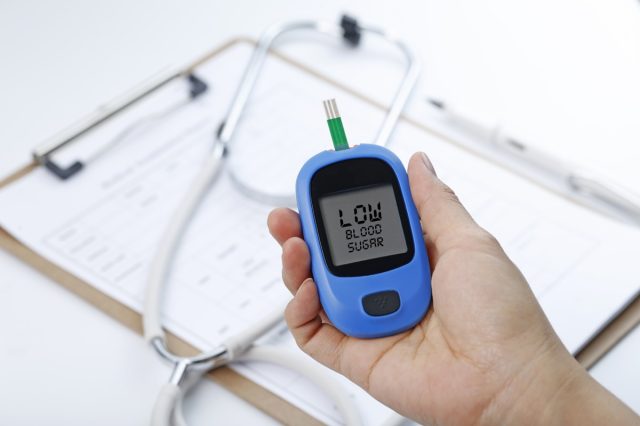Blood sugar is your body's main source of energy and maintaining normal levels is vital for your overall well-being, but anyone with diabetes knows it can be common for blood sugar to drop and when it's below 70 mg/dL chances are you start feeling off and not like yourself. While there can be quick fixes to boost your blood sugar quickly, it's always recommended to see your physician and treat the problem immediately. When left unmanaged, low blood sugar can lead to serious complications and in rare cases even death. Eat This, Not That! Health spoke with Bonnie Taub-Dix, RDN, creator of Better Than Dieting and author of Read It Before You Eat It – Taking You from Label to Table who shares what to know about low blood sugar and signs it's dropping fast. As always, please consult with your physician for medical advice. Read on—and to ensure your health and the health of others, don't miss theseSure Signs You've Already Had COVID.
1
What to Know About Blood Sugar

Taub-Dix tells us, "Blood sugar levels can be impacted by many things including your diet, your sleep habits and your exercise routine. Blood sugar levels can also depend on whether you have certain medical conditions like diabetes or hypoglycemia, but both of those conditions can be controlled through diet, exercise and medication. Blood sugar levels may rise and fall during the course of a day, but the goal is to keep them stable within a normal range."
2
Why Blood Sugar Can Suddenly Drop

Taub-Dix explains, "Sudden drops in blood sugar levels can occur when you've gone too long without eating, particularly after you've exercised. Some people are also prone to low blood sugar levels or may be susceptible to low blood sugar because of medications they may be taking. For those who have diabetes, taking too much insulin can also cause blood glucose levels to be erratic and drop dangerously. In some cases of illness, like flu, nausea and vomiting, when food intake is limited, you may feel dizzy, lightheaded and weak as a result of not being able to eat properly and therefore leading to low blood sugar."
3
The Health Risks of Plummeting Blood Sugar

According to Taub-Dix, "Plummeting blood sugar could be incredibly dangerous especially if you're driving a motor vehicle, riding on a bicycle, operating machinery or you're alone, to name just a few examples. A crash in blood sugar levels could cause you to fall, hit your head or seriously hurt yourself."
4
Talk to a Dietitian

Taub-Dix suggests, "If you notice that you have a tendency for your blood sugar levels to drop and you're feeling lightheaded, dizzy, weak, lethargic and you have a lack of concentration, you should check with your healthcare provider. Perhaps you need some dietary advice from a dietitian and you also should take a battery of blood tests to see if you need to take medical care further with meds. By the way, some people are also impacted by drinking alcohol (especially on an empty stomach) and consuming too much caffeine."
5
Palpitations or Fast Heart Rate

Taub-Dix explains, "Low blood sugar levels could cause a fast heartbeat or palpitations."
6
Shaking and Sweating

"When you're feeling shaky or sweaty, you need to ask yourself when was the last time you ate and what did you eat.," Taub-Dix says. "Certain foods, like simple carbs, can be easily digested and absorbed which cause your blood sugar levels to rise quickly and then crash. By adding protein and healthy fat to your meal and by choosing a whole grain carb that will break down more slowly, you're more likely to keep blood glucose levels in control without feeling like you're on a roller coaster."
7
Extreme Hunger and Irritability

Taub-Dix states, "When your tummy is empty you won't have enough fuel for your body to run on. You could literally feel like laying on your bed instead of sitting up at your desk. The key is eating a balanced meal with the stellar trifecta of protein, whole grain carbs and healthy fats to help satiate you and provide you with nutrients that work together to keep blood sugar levels stable."
8
Lightheadedness and Dizziness

Taub-Dix tells us, "Sugar fuels your brain. Too much sugar can obviously have a negative impact as well, but when you don't eat or when you don't eat the right balance of foods, it could cause you to feel dizzy and weak."
9
Anxiety

Taub-Dix shares, "Interestingly, some of the signs and symptoms of low blood sugar resemble signs of an anxiety attack. When someone might feel like they're starting to feel weak or dizzy, they fear that their blood sugar levels would plummet to dangerous levels. This can cause a panic attack. The bottom line is that you need to pay attention to your personal symptoms and perhaps keep a diary, including a food diary, to be able to detect any patterns that are contributing to the problem. Getting the help of a physician or dietitian can help to set you on the right path by just making a few tweaks to your diet and by giving you some advice about exercise and sleep habits. Simple blood tests can also provide a wealth of information to determine the extent of your medical problem."
No comments:
Post a Comment